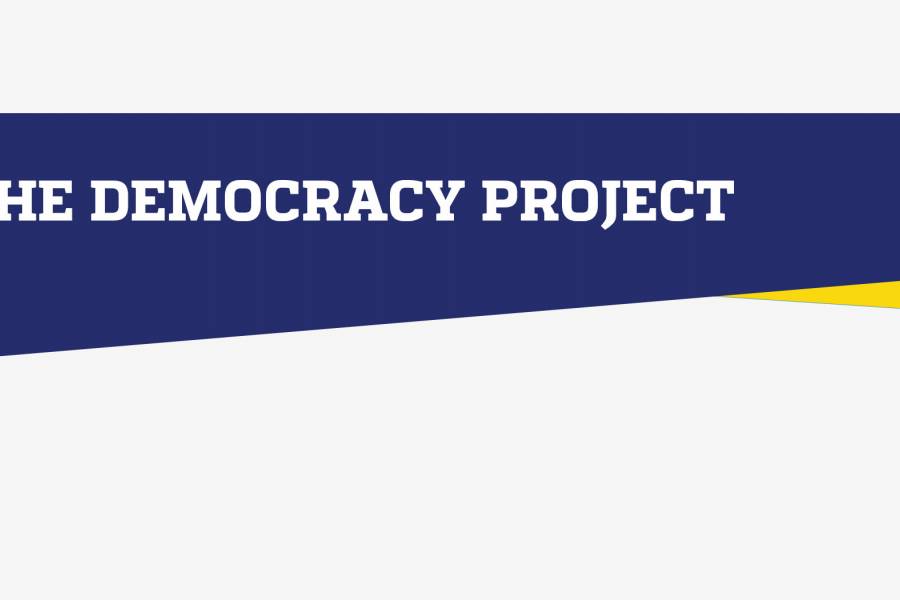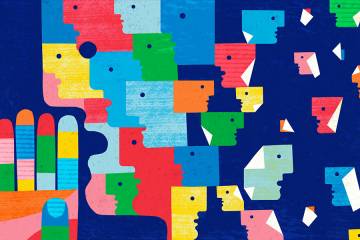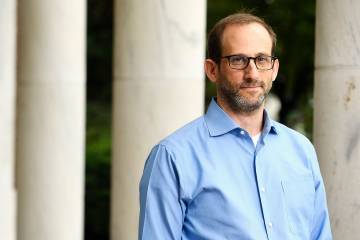
Image caption:Lisel Hintz studies the arenas in which struggles over various forms of identity—national, ethnic, religious, gender—take place.
Image credit: Will Kirk / Johns Hopkins University
Around the world, authoritarianism and populism have been on the rise during the past decade. One such enclave is Turkey. At the turn of the century, some felt the nation was poised to become a democratic, human rights-respecting country. However, today Turkey is generally viewed as the personal dictatorship of President Recep Tayyip Erdogan. At best, that nation's government functions as a hybrid of authoritarianism and democracy.
Academics and journalists there have been under siege, with many arrested under the state of emergency declared after an aborted coup in July 2016. Reporters Without Borders assigned Turkey the rank of 157 out of 180 countries on its 2018 World Freedom of Press Index.
Lisel Hintz, an assistant professor of international relations and European studies at SAIS, studies the arenas in which struggles over various forms of identity–national, ethnic, religious, gender–take place. Her regional focus is on Turkey and its relations with Europe, the U.S., and the Middle East. Her current book project, under contract with Cambridge University Press, investigates Turkey's state-society struggles over identity in the pop culture sphere. The Hub spoke with Hintz, a frequent media contributor, on Turkey's authoritarianism and its parallels with forces at play here in the United States.
You've been studying authoritarianism and Turkey for some time now. Are you seeing any particularly troubling signs of what's been playing out there, or in the rest of Europe, here in the United States?
I'm actually working on a piece right now comparing the two countries through different channels in which de-democratization takes place. You might also hear terms like democratic erosion or democratic breakdown. I prefer de-democratization because it not only suggests that democratization is not linear but that the term helps to parse out the spaces in which democratic norms and procedures are no longer being followed—say, voter suppression or partisan stacking of the judiciary—while other areas remain relatively untouched (for now). The concept helps us identify early warning signs.
Some of what I've observed in Turkey is either the delegitimization or the co-optation of the media, for example. And that is one thing that really strikes me in the United States, the delegitimization of journalists who don't agree with the president, the vilification of the media, the attempts to portray any criticism as "fake news"—this idea that journalists are inherently the enemy. President Trump calls it a "beautiful thing" when journalists are hustled out of his rallies or struck by rubber bullets during demonstrations. He's not just calling critical journalists liars but also glorifying violence against them. Turkey is frequently cited as the No. 1 jailer of journalists in the world. So this targeting of journalists and the media is something specifically where I see quite a lot of overlap between Turkey and the United States.
There's also the co-optation of the media that's happened in Turkey. There you have a landscape where 90% to 95% of the media in Turkey is controlled by or influenced by the ruling party, the AKP—Erdogan's party. And that is because the political and economic landscape in Turkey consists of five or six major holding groups that own media channels, but also have banking interests, construction interests, and financial interests where they need safety regulations loosened and so forth. These groups have a very strong political stake in pleasing the government, so therefore their journalists don't write much that's critical. It's self-censorship. I think Trump's wooing of Fox News got to the point where it was a fascinating, symbiotic relationship.
In the U.S., it seems there's a lot of finger pointing at others by those in power, laying the blame for—any problem, really—at the feet of various segments of the population.
There's this practice of what I call rhetorical vilification of the opposition. By this, I mean there are three strategies of delegitimizing anyone who doesn't agree with you. I call these naming, blaming, and framing strategies. You use culturally-salient, emotionally-evocative words in order to get a response from your audience to delegitimize opposition and justify and crack down against them. In the Turkish case, the example is the Gezi Park protests that began in May 2013. I saw a lot of parallels between the Black Lives Matter protests and the Gezi Park protests, not in the sense of how the protesters were acting necessarily but in the authoritarian toolbox of strategies that Trump and Erdogan, respectively, were using to repress them.
I feel like Erdogan really honed his technique during this period, and he uses it all the time now. What started as this tiny environmental movement basically spread into a nationwide protest overnight. The violent police crackdown on peaceful protesters, and the media silence that followed as a result of self-censorship, fueled protests in 80 of 81 provinces. So, what does Erdogan do? Because this is the first major challenge to his stronghold, he decides to call anyone who is out in the street a "çapulcu," Turkish for "hooligan" or "looter." It's a way in blanket fashion to paint anyone joining a peaceful protest as someone who is doing violence to the country. That is also very much what Trump uses. His term is racially charged, because he uses "thugs," which basically comes from a prejudiced belief reinforced by the media the in the U.S. that Black men are violent. By using this term, he can negatively paint an entire swath of diverse and peaceful protesters, particularly Black protesters, as threatening. He's able to draw from that racist cultural context and create fear, thus delegitimizing demonstrators and justifying the crackdown against them.
If that's naming, what is blaming and framing?
Blaming is when you either create incidents that you say the opposition did, or you very heavily amplify a minor incident of what some protesters are doing. In the Turkish context, there was very, very little violence during the Gezi Park protests—from what I observed firsthand and the research I conducted. Yet state-friendly media made up stories, like one of a young woman in a head scarf with a baby carriage attacked by bare-chested, balaclava-wearing "hooligans" who beat her and then urinated on her. Imagine every single trope that would offend a pious Muslim. But then later we see the actual video footage of the incident. The woman is standing there with her baby carriage, she gets on the ferry and she's fine. Nothing happened. It was complete fabrication. You will also see state media repeatedly show one act of violence, one man throwing a Molotov cocktail, and they'll say that is happening everywhere.
They're trying to create these horrific images using culturally-salient references. Trump did this on his walk from the White House over to the church. He holds up the Bible, saying to the camera, "Did you get the Bible?" He notes the damage that was done to the church, which was minimal, as evidence that protesters are defiling our religious institutions. They are destroying sacred property. Elsewhere, you see this amplification and misplaced accusations of other acts such that it seems the majority is rioting.
Framing is how you link protests to nefarious larger forces, claiming these protesters' grievances aren't legitimate, they're not indigenous or organic. Erdogan claimed the Gezi protests were linked to external saboteurs, like an interest rate lobby that wants to ruin Turkey's economy. It was George Soros–funded. It was funded by the U.S. It was an Israeli lobby. All kinds of ways he could say these aren't actually real Turks who have a problem with him. Trump does this by talking about the radical left, Antifa, Marxists. It doesn't matter if the audience knows what Marxist really means, all they know is it sounds scary, radical, and is clearly "other."
Some will point out that Turkey is not the United States, and you can't compare the two as they have different histories, different populations of people, different systems of government.
It's important for me to always point out that the structural differences between the United States and Turkey are huge. It's not apples to apples, but it's not apples to waffles either at this point. What I think is really important to recognize is that I believe that there has been an immense sense of hubris in the United States, an American exceptionalism, which says that won't happen here—it can't happen here. For me, what's important to recognize is that it can happen here, and it has happened here. There's been voter suppression against Black Americans, voter suppression against homeless Americans. Different legislative tools have been used to disenfranchise voters since the founding of this country. And yes, we made progress during the civil rights movement, but it's not to the point where everybody has equal access. It's not an even playing field.
But you're right. The United States is not the same thing as a country that was in the process of democratizing. When the AKP came into power in 2002, there was all this optimism about the government being a blend of conservative democracy and Islam, once they roll back the role of the military. But what the AKP did is—and what's similar in Hungary, Poland and, yes, the United States—is that they use legal means to shift the contours of the system. You use things like referenda, or you use things like the president's ability to pick particular justices. You use legal means to change the regime, to consolidate power, and stack institutions of governance that otherwise would be the checks and balances that we assume continue to function.
I hate the term, but democracy is in a sense a "gentleman's agreement," a pledge to adhere to specified norms and procedures. So, the idea that someone would violate the Hatch Act, or the idea that you would put all of your children in positions of power, there's a sense that there's something not quite right about that, and politicians in the U.S. would never do that. But they do, because they can.
The United States has had a democratic regime for a long time, but it hasn't applied to everybody. The UK is the oldest democracy in the world, but its democratic norms haven't applied to everybody either, and we've seen a massive rise of populism and discrimination there. If you don't have individuals who are willing to respect the norms of democracy, if they're willing to put their interests and political power and, I would say, financial gain, over those norms, then it can happen anywhere.
I'm not sure I want to end here, because it's a chilling quote from you that was in The Atlantic, but let me read it back to you. You said: "The goal of competitive authoritarians is to get people to just give up." Atlantic writer David Litt added, "The fate of Americans' democracy may soon rest on whether its people demand democracy or abandon it."
I stand by that article as a call to action, and will give one last Turkey example that I think provides insight into why Americans need to be vigilant. In Turkey's 2018 presidential election, an opposition candidate named Muharrem Ince emerged from a field of challengers to Erdogan as a contender who could bridge some of the divides that previously fractured Turkey's opposition. He was fierce and feisty and funny, and he could give back to Erdogan as good as anyone, and it seemed he would not back down from any challenge. Ince unexpectedly rallied a whole lot of people behind him despite the uneven playing field and Erdogan's attempts to vilify him. You have this individual who is able, at the last minute, to rally all of this support, and the opposition has optimism. On election night, though, Erdogan makes his traditional balcony victory speech early, way before ballots are even done being counted. He claimed that according to unofficial results he had won. His supporters immediately flow into the streets, he pulls off a fait accompli. The election board later certified his victory, being one more institution under Erdogan's influence.
Now here's what's important for America. What does Ince do? He disappears. He doesn't go on television or make a statement. All he does is send a text message to a journalist reporting live on television saying, "The guy won." So he basically concedes on live TV. Why is that important? Because everybody who had been so excited, who supported Ince because at least he wasn't Erdogan, is immediately deflated and thus defeated. They leave their monitoring positions at polling stations where votes were still uncounted. Ince disappeared and conceded, leaving victory to be claimed by Erdogan.
And that's what we cannot do in the United States. We cannot allow an election to be claimed if it's not legitimately won. We have to push with every ounce of energy that we have. It's crucial that we not allow this to be a fait accompli by the incumbent because he has access to the tools of power. That's not democracy. I think complacency is our worst enemy, and we need to ensure that democracy functions the way that it is meant to and not the way that the party in power wants it to.
About The Democracy Project
The future of democracy as a system of government is increasingly uncertain. With a rise of populist forces globally and many existing democracies in regression, liberty itself seems under assault. In the United States, a diminished or warped democracy could have far-reaching repercussions for voting rights, the rule of law, education, the application of science, immigration, citizenship, and long-held societal norms we take for granted.
As we near an election in which many of the defining principles of democracy seem to hang in the balance, an array of Johns Hopkins experts will share their greatest hopes, their deepest fears, and their informed insights on the state of America's democratic experiment. Read more from The Democracy Project
Posted in Voices+Opinion, Politics+Society
Tagged democracy











